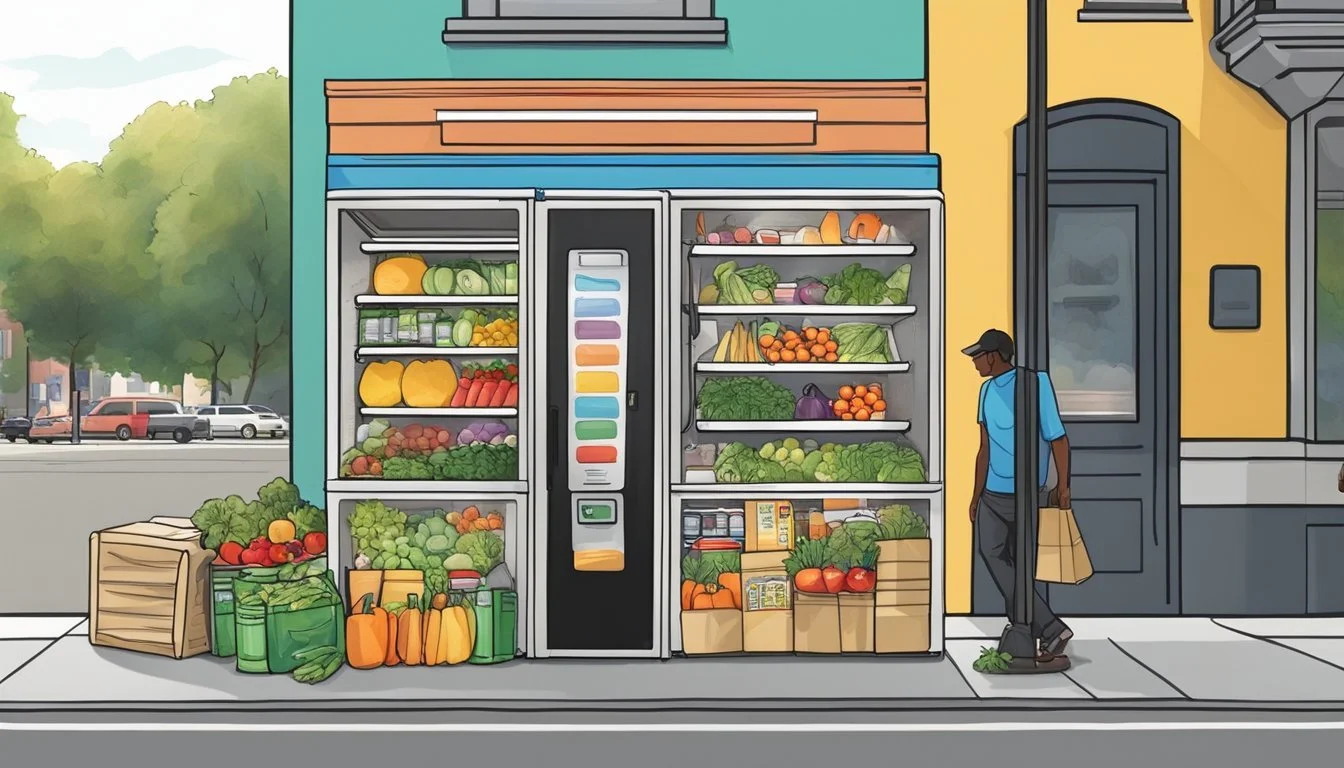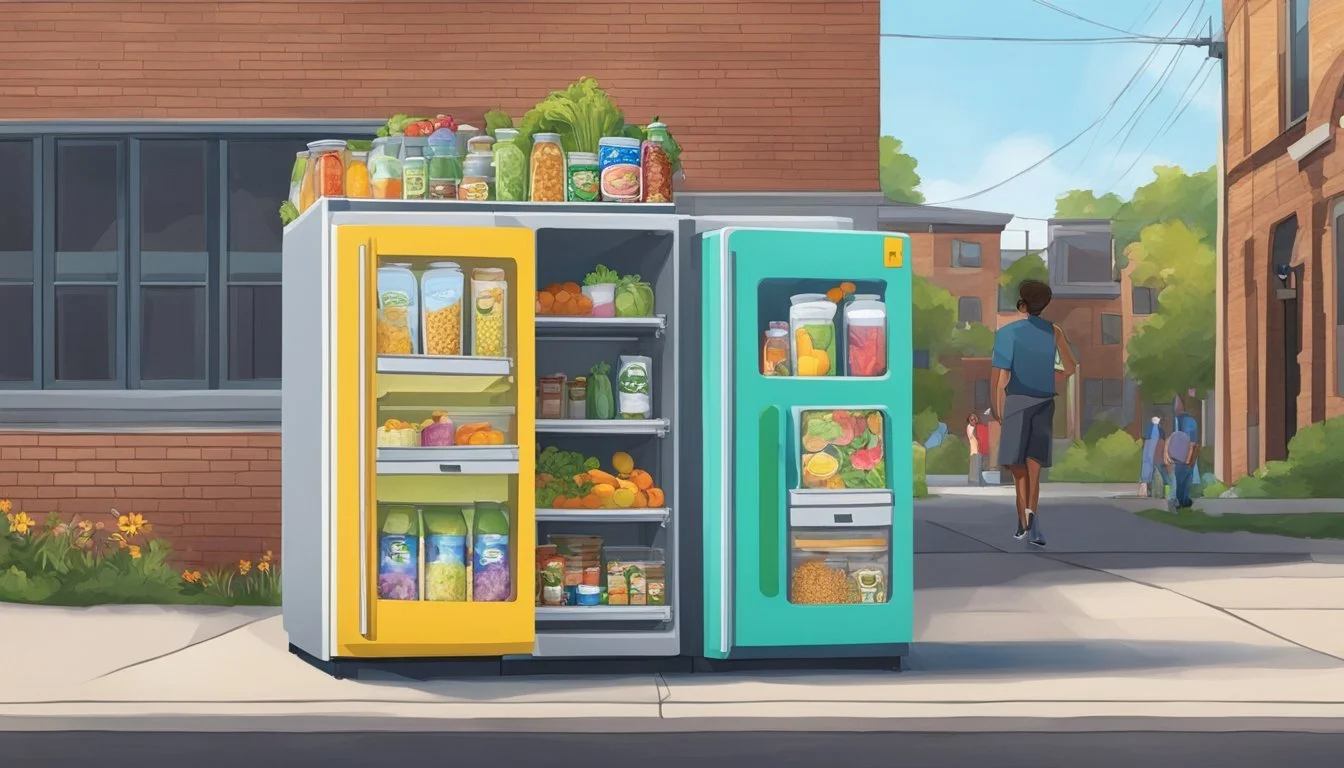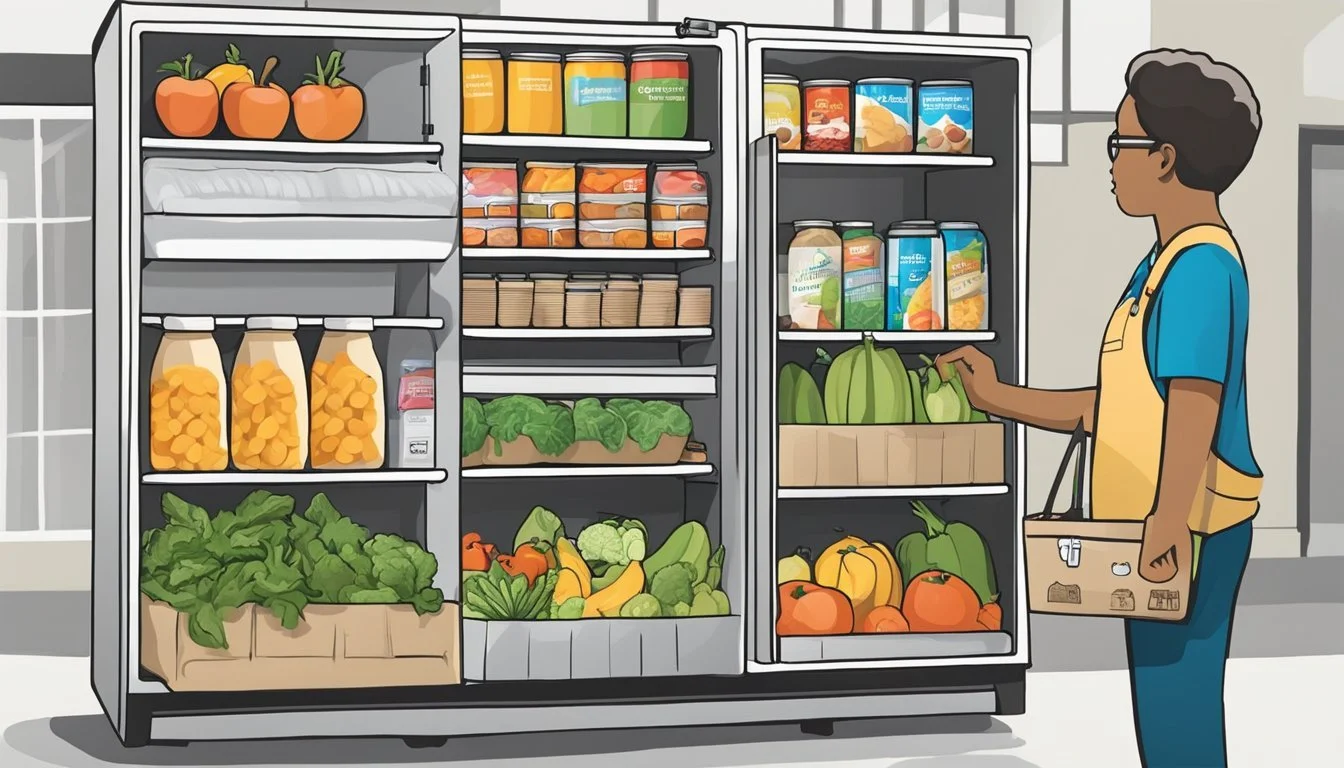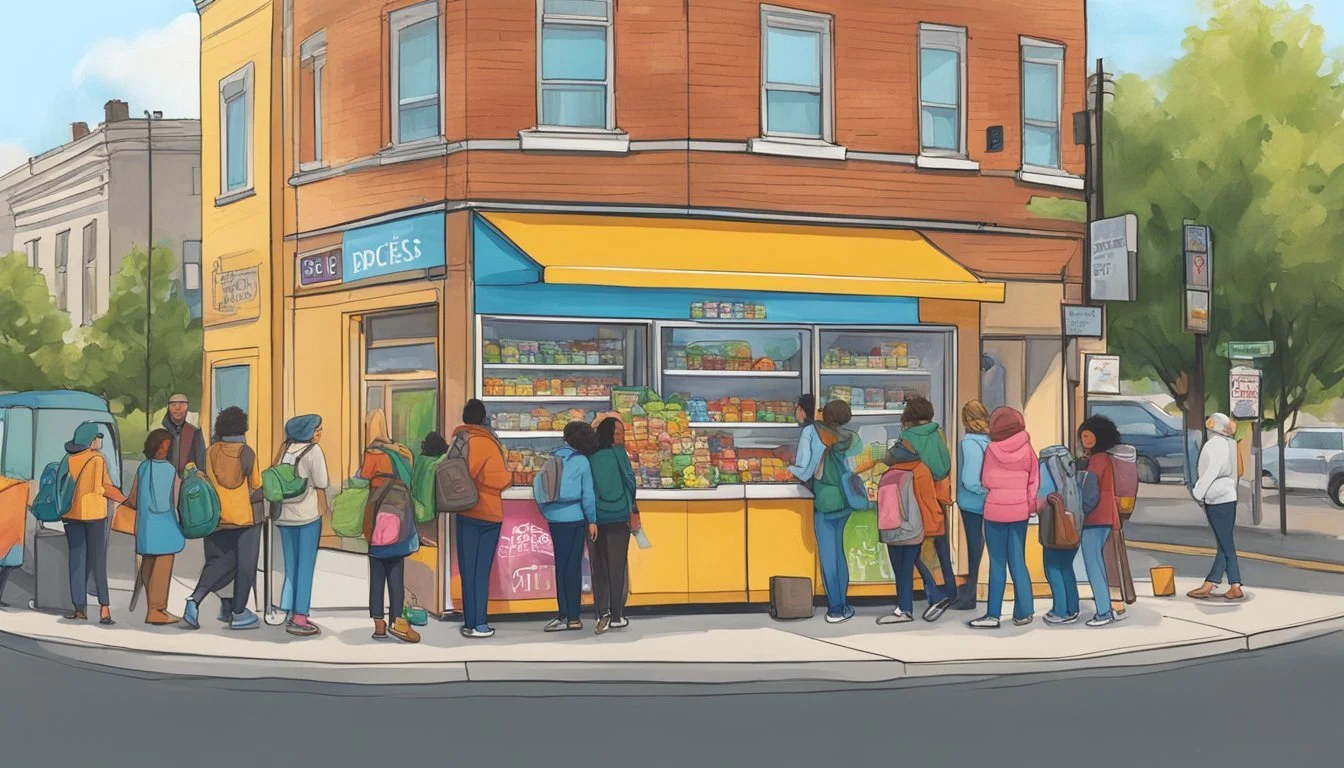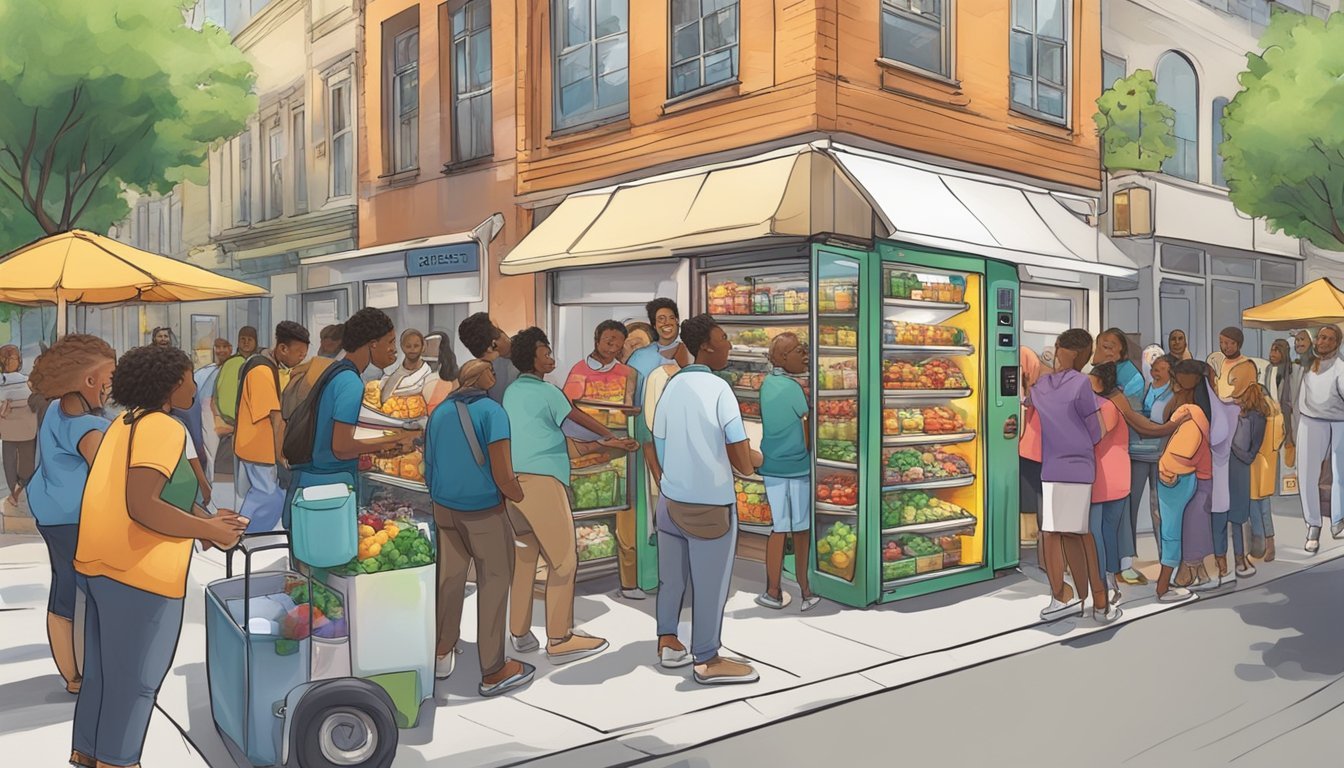Des Moines, IA Community Fridge
Nourishing the Neighborhood Together
In Des Moines, Iowa, a new approach to addressing food insecurity and fostering community involvement has emerged through the initiative of community fridges. These refrigerators are strategically placed throughout the city to provide free food to those in need. They operate on a simple principle: anyone can take what they need and, if able, leave food for others. Far from being mere food storages, these community fridges have become social infrastructure that not only feed but also connect people from all walks of life.
The community fridge initiative in Des Moines offers a variety of locations where residents can access fresh produce and other perishable items. Libraries, such as the Des Moines Public Library, host some of these fridges, making them easily accessible to a wide audience. Not confined to daylight hours, some of these fridges are accessible 24/7, providing constant support to individuals and families who may find themselves in need at any time.
These fridges are a testament to the community spirit and the belief in collaborative care for one another. They stand as a symbol against food wastage and as a pillar of support for sustainable practices in urban living. Through these community efforts, Des Moines exemplifies how cities can come together to ensure no one goes hungry and everyone has the opportunity to share in the bounty of the community's resources.
What Is a Community Fridge
A community fridge in Des Moines, IA, serves as a resource for the local population to combat food insecurity by providing free and accessible food.
Purpose and Goals
The primary purpose of a community fridge is to mitigate food insecurity among residents. It operates on the principle of sharing, where individuals and organizations donate food, and those in need are welcome to take what they require. Goals include reducing food waste, fostering community solidarity, and ensuring everyone has access to fresh and nutritious food regardless of their financial situation.
Accessibility and Location
Accessibility is a cornerstone of the community fridge initiative. The fridge is designed to be publicly accessible, with easy-to-follow guidelines that facilitate both donations and the respectful retrieval of food.
Locations in Des Moines are thoughtfully chosen to be convenient and visible to maximize support and usage. For instance:
Location Address Notable Features Community Youth Concepts Community Fridge 1446 Martin Luther King Jr Parkway, Des Moines, IA 50314 Located in a white shed behind the building Des Moines Public Library Community Fridges Breezeway of the north entrance of the Central Library off of Grand Avenue Open during library hours
These refrigerators ensure that support is continually available to individuals within the community who may be in need of assistance.
Locations in Des Moines
The community fridge initiative in Des Moines serves as a symbol of communal support and care, providing free food resources for those in need. These refrigerators are strategically located across the city to ensure accessibility.
North Des Moines Community Fridge
The North Des Moines Community Fridge is easily accessible to residents living in the northern part of the city, hosting two key sites. One is located at 5720 Urbandale Ave, Des Moines, IA 50310, while the second site is positioned at 2300 Hickman Rd., Des Moines, IA. This initiative caters to the community without any prerequisites, symbolizing the inclusive values of Iowa's ensuring that residents in the River Bend neighborhood have close access.
Sweet Tooth Community Fridge
Strategically positioned at 1618 6th Ave (Home INC Parking Lot) Des Moines 50314, the Sweet Tooth Community Fridge stands as a beacon of community spirit on the north side of Des Moines. It emphasizes the importance of mutual aid, allowing individuals both to contribute and take from the fridge as needed.
Central Library Community Fridge
The Central Library Community Fridge is a part of the broader Des Moines Public Library's mission to serve the local community beyond traditional library services. Situated in the breezeway of the north entrance of the Central Library, it is an easily accessible spot for residents and visitors to take advantage of.
Franklin Community Fridge
Located at the South Side Library, known as the Franklin Avenue Library, the Franklin Community Fridge serves as an essential community resource on the south side of Des Moines. It not only provides access to food but also nurtures the sense of community among the diverse population segments that frequent the Franklin Avenue corridor.
Operating a Community Fridge
Operating a community fridge in Des Moines, IA, entails consistent maintenance for safety, adherence to hosting guidelines, and robust coordination between volunteers and donors. These aspects ensure the service efficiently supports those in need.
Maintenance and Safety
They must regularly maintain community fridges to ensure they offer a safe, hygienic, and reliable service. Maintenance includes frequent cleaning, checking temperatures, and ensuring that food is fresh and properly stored. Safety protocols involve:
Regular Cleaning: Daily cleaning of interior and exterior surfaces.
Temperature Checks: Ensuring the fridge stays at a safe temperature to prevent food spoilage.
Hosting Guidelines
Entities that host a community fridge must abide by very specific guidelines to ensure effective operation. These guidelines are crucial for keeping the service running smoothly and can include:
Location: Choosing accessible areas that are visible and easy to reach.
Partnerships: Working in conjunction with local businesses and organizations for support.
Permits: Securing proper zoning permits to operate in compliance with local regulations.
Volunteer and Donor Coordination
Volunteers play a fundamental role in the operation of community refrigerators. They maintain the space, sort food donations, and interact with community members. Donors are essential for the supply of food items. Coordination efforts are based on:
Schedules: Maintaining volunteer shifts to cover all operational hours.
Donation Guidelines: Providing clear instructions on what can and cannot be donated.
Outreach: Engaging the community to sustain a stream of donations and volunteer support.
Contributing to the Fridge
Community members can support the Des Moines Community Fridge initiative by donating various food items. Safe handling and food freshness are paramount when stocking the fridges.
Donation Suggestions
Perishables:
Eggs
Fresh fruit and vegetables
Meat (well-packaged)
Milk
Yogurt
Cheese
Deli meat
Non-perishables:
Bread
Rice
Pasta
Grains
Dry beans
Canned goods
Oatmeal
Donation Process
When donating, individuals should:
Ensure that food is unopened and within its use-by date.
Package and label food to clearly indicate contents and freshness.
Deliver donations during the host site's operating hours.
It is important for donors to remember only to provide food that they would deem worthy of their consumption, thereby respecting the dignity and health of all community fridge users.
Benefits for the Community
Community fridges in Des Moines, IA offer a suite of benefits, ranging from reducing food insecurity to fostering stronger communal ties.
Addressing Food Insecurity
Community fridges serve as a pivotal response to food insecurity in Des Moines by providing 24/7 access to free food. These refrigerators are strategically located to be easily accessible to those in need, ensuring that community members have a reliable source of nourishment without barriers.
Nutrition and Health
By stocking community fridges with a variety of foods, they emphasize the importance of nutrition and health. The availability of fresh produce and healthy options allows individuals, especially those facing economic challenges, to make dietary choices that might otherwise be unaffordable, supporting a healthier community.
Building Community Relationships
Community fridges operate on the principle of mutual aid and collective responsibility, which inherently builds community relationships. The fridges not only encourage donations and volunteering from community members but also become a point of connection, promoting solidarity and understanding among diverse groups within Des Moines.
Challenges and Solutions
Community fridges in Des Moines, IA, have emerged as a promising solution to address food insecurity, yet they face certain challenges that necessitate practical solutions to be effective and sustainable.
Food Safety and Regulation
Guidelines are paramount to ensure food safety and to comply with regulatory standards, which are obstacles community fridges regularly encounter. Organizations must ensure that the food stocked is handled and maintained according to health regulations. Periodic inspections and collaborations with food safety authorities can help maintain high standards and reduce health risks.
Challenge: Compliance with health regulations to safeguard public safety.
Solution: Implement robust protocols for food handling and collaborate with health officials.
Financial Sustainability
Financial sustainability is crucial for community fridges to remain stocked and operational. Funding is essential for ongoing expenses such as electricity, maintenance, and restocking of perishables to prevent shortages.
Challenge: Securing ongoing donations and managing operational costs.
Solution: Establish partnerships for food and financial donations, and promote community-based fundraisers.
Community Engagement
Community engagement is key to overcoming barriers and enhancing the reach of community fridges. Increased public awareness and active participation are needed to combat hunger and ensure regular contributions.
Challenge: Mobilizing community support and consistent stocking of fridges.
Solution: Leverage social media, local events, and food rescue initiatives to foster involvement and donations.
Understanding the Impact
Community fridges in Des Moines, Iowa, managed by various organizations including Eat Greater Des Moines, have become pivotal in addressing food insecurity. They provide a dignified way for residents to access fresh food and contribute surplus items. This section explores individual successes and analyzes the program's data to grasp its broader effects.
Success Stories
Eat Greater Des Moines has been influential in the establishment and success of community fridges throughout the city. Individual stories reflect a significant positive effect on residents' lives, providing both anecdotal evidence and encouragement for the program's continuation. For instance, the community fridge on Martin Luther King Jr Parkway, with its 24/7 access, has seen a consistent usage by locals thankful for the easy access to nutritious food without any judgment or stigma attached.
Statistics and Data Analysis
Data from various sources paint a clear picture of the impact of community fridges. Eat Greater Des Moines reports the distribution of approximately 40 refrigerators in strategic locations, gaining traction in Polk, Dallas, Warren, and Marion counties. While specific usage statistics are not disclosed here, the action of expanding the program conveys a significant demand and a successful response to it. The positive reception by the community and steady inclusion of new fridge locations underscore the effectiveness of this initiative in combating food scarcity.
Future of Community Fridges
Community Fridges in Des Moines, IA, are poised for growth, with plans for technological enhancements and increased collaboration with local entities to strengthen the network and support food security.
Expansion and New Initiatives
The network of community fridges, currently a vital hub for food sharing in Des Moines, anticipates notable expansion within the region. Polk County and surrounding areas, including Altoona, could see new fridge installations. Initiatives like the North Des Moines Mutual Aid are instrumental in this growth, fostering a cooperative spirit. A focus on establishing fridges in public spaces ensures accessibility to fresh food where it’s most needed.
Technological Advancements
Technological innovation is set to streamline the operation of community fridges. Features such as remote temperature monitoring and inventory tracking could be introduced to maintain food safety standards and efficiency. Nonprofit organizations and tech firms might soon partner to implement these improvements, ensuring the sustainability of the community fridge network.
Collaboration with Local Organizations
Enhanced partnerships with local organizations are central to the community fridge movement’s future. HOME Inc., known for its commitment to community development, and libraries like the one on Grand Avenue, where Sue Woody leads initiatives, are expected to join forces, creating a stronger sense of community. These collaborations may also involve local farms, enriching the supply chain and providing a diverse range of fresh produce to the network.
Through these focused efforts, Des Moines’ community fridges will continue to serve as a dynamic, essential resource for residents, reducing food insecurity and fostering community resilience.

